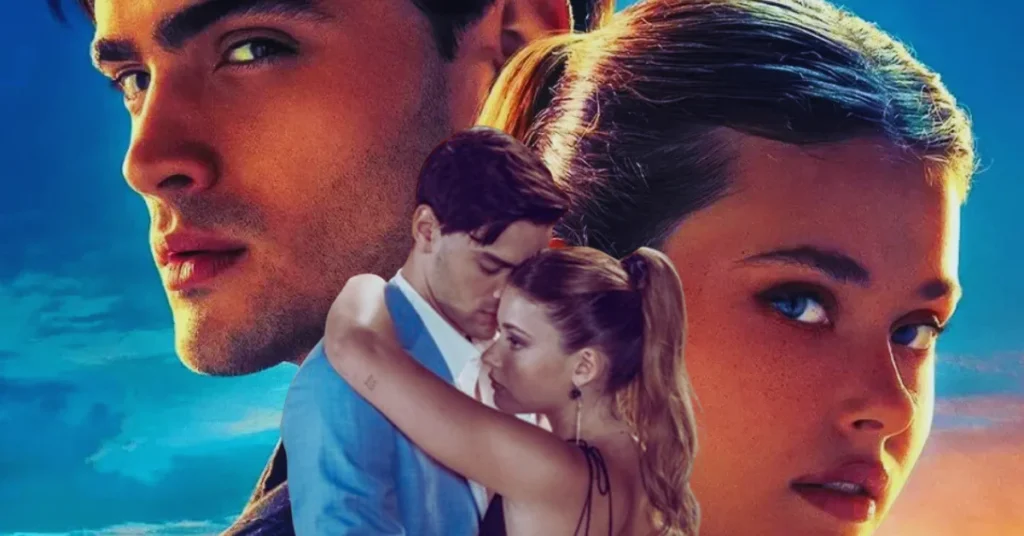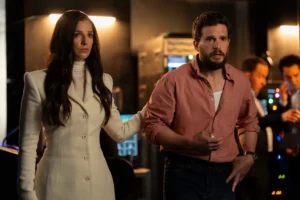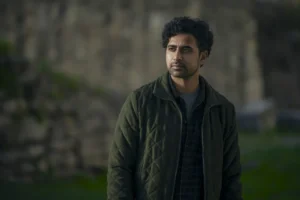Summary
Your Fault is a dramatic step-up to My Fault, providing some weaving subplots, and giving the fans what they want – Noah and Nick.
Your Fault (“Culpa Tuya”) is a heavy sequel to the global hit My Fault, mainly because it does not hold back—the plethora of sex scenes proves this. But it’s not just the steaminess that makes Your Fault compelling—it has a similar vibe to the After movie series, which it’s trying to best (and most likely to do so after that dreadful After Everything).
Let me explain the scenario in the second movie of the already-confirmed trilogy. Following the events of My Fault, the parents of Noah and Nick (Will and Rafaella) have remained determined to keep their lusting children apart. Nick (Gabriel Guevara) has been sent to his father’s law firm in Sam Francisco for a year and is encouraged to spark a romance with work colleague Sofia. Meanwhile, Rafaella (Marta Hazas) is doing everything she can to ensure Noah (Nicole Wallace) does not live with Nick, setting her up in a college apartment so she can have the whole experience.
Of course, their attempts to stop them from being together do not work, as proven at the start of Your Fault as Nick arrives at the end of Noah’s 18th birthday, where they naturally have sex against the wall with barely any difficulty because, by this point, they’ve had sex a lot. Their parents have underestimated them.
Putting aside the fact that this teen fictional drama plays on the whole step-sister/step-brother dynamic that has rotted the brains of our younger generation, Your Fault proves there are plenty of stories to tell. Nick continues to be flawed, undermined by his fear of abandonment. Noah feels that Nick’s family’s wealth is controlling her life.
On the sidelines is a volcano ready to explode: Nick’s ex returns, Briar (Álex Béjar), who happens to be Noah’s dormmate. She has a past she wants to avenge with Nick. But Nick’s mother, Anabel (Goya Toledo), returns, too, desperate to prove she did not abandon her son and lay blame on Will and Rafaella.
At first, I felt like a 2-hour running time for the second film was far too much. Firstly, it gives the fanbase what they want, which is a lot of Noah and Nick enjoying each other, and secondly, it teases whether they wish to remain together. However, the writers manage to weave in some compelling subplots that fill the gaps. For example, Lion (Víctor Varona) is insecure about being unable to provide for his wealthy girlfriend, Jenna (Eva Ruiz), and the crime world that surrounds street racing (yes, this makes an exciting return in Your Fault).
Let’s not discount Sofia’s role in all this, played by the stunning Gabriela Andrada. Director Domingo González teases the audience with potential new romances to up the drama but provides Nick with a genuine temptation that Noah would fear.
There’s a real message in Your Fault about modern relationships. The basis of the drama starts when Lion and Nick feel insecure about their partners joining college and embarking on a new life. They think they’ll be left behind due to the next experiences they’ll face. This is true today; young couples chase artificial experiences, and dopamine hits due to the fear of missing out rather than doing the hard work of commitment. Of course, there’s irony in this approach by Nick and Lion’s thinking – it causes more problems and has them questioning their insecurity (trust me, I’ve been there).
If you’ve watched the After movie series, Your Fault will have no surprises. The titles do not hold back. The next movie is called Our Fault (“Culpa Nuestra”), and the ending provides context to this meaning. Has Your Fault been worth the wait? Certainly, I’d argue that it causes just as much chaos and tension at first, but this time, it gives the fans more of what they want (Noah and Nick being very intimate). But how this series ends will be key. That will determine the rewatch value.
As a final point, check the director’s hard drives because he’s super selective about when Noah and Nick refer to each other as brother and sister. One minute, it doesn’t matter; next, it’s vital to the plot. Surely, after everything that’s happened, these characters wouldn’t even refer to each other in this way anymore?




